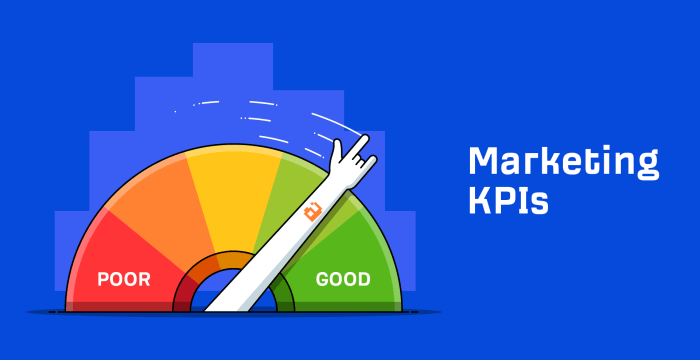Tracking Marketing KPIs is like decoding the secret sauce of marketing success, diving deep into the metrics that drive businesses forward with an edgy American high school hip vibe. Get ready to uncover the key to unlocking marketing greatness!
From understanding why tracking KPIs is crucial to exploring the tools and best practices for analysis, this journey will equip you with the knowledge to revolutionize your marketing game.
Importance of Tracking Marketing KPIs
Tracking marketing Key Performance Indicators (KPIs) is crucial for businesses to gauge the effectiveness of their marketing efforts and make data-driven decisions to optimize their strategies. By monitoring KPIs, companies can measure the impact of their marketing campaigns, identify areas for improvement, and ultimately drive better results.
Examples of Key Marketing KPIs
- Conversion Rate: This measures the percentage of website visitors who take a desired action, such as making a purchase or signing up for a newsletter.
- Customer Acquisition Cost (CAC): The cost associated with acquiring a new customer, including marketing and sales expenses.
- Return on Investment (ROI): This KPI calculates the revenue generated from marketing efforts compared to the cost of those efforts.
- Website Traffic: The number of visitors to a website, which can indicate the effectiveness of marketing campaigns in driving engagement.
How Tracking KPIs Measures Marketing Success
Tracking KPIs allows businesses to assess the performance of their marketing campaigns in real-time and make adjustments as needed to optimize results. By analyzing KPI data, companies can determine which strategies are most effective in reaching their target audience, driving conversions, and ultimately achieving their marketing goals.
Setting SMART Marketing KPIs
In order to effectively track marketing performance, it is crucial to set SMART Marketing KPIs. SMART stands for Specific, Measurable, Achievable, Relevant, and Time-bound. These KPIs help marketers establish clear objectives and goals to measure success accurately.
Defining SMART Marketing KPIs
- Specific: Ensure your KPIs are well-defined and target a specific aspect of your marketing strategy. For example, increasing website traffic by 20%.
- Measurable: Make sure your KPIs can be quantified and tracked over time. An example would be tracking the number of leads generated from a specific campaign.
- Achievable: Set realistic goals that can be attained with the resources available. Setting a goal to double sales in a week may not be achievable.
- Relevant: Align your KPIs with your overall marketing objectives to ensure they are relevant to your business goals. For instance, increasing social media engagement to improve brand awareness.
- Time-bound: Establish a timeframe for achieving your KPIs to create a sense of urgency and focus. Setting a goal to increase email open rates by 10% in a month is time-bound.
Examples of SMART Marketing KPIs
| Marketing Campaign | SMART KPI |
|---|---|
| Social Media | Increase Instagram followers by 15% in three months. |
| Email Marketing | Improve click-through rate by 10% in one month. |
| Content Marketing | Boost organic website traffic by 20% in six months. |
Tools for Tracking Marketing KPIs
![]()
In the fast-paced world of marketing, keeping track of key performance indicators (KPIs) is crucial for measuring success and making informed decisions. There are several tools and software available to help marketers efficiently track and analyze their KPIs.
Popular Tools for Tracking Marketing KPIs
- Google Analytics: A widely-used tool that provides in-depth insights into website traffic, user behavior, and conversion rates.
- HubSpot: Offers a comprehensive platform for tracking various marketing KPIs, including lead generation, email marketing, and social media performance.
- Kissmetrics: Focuses on customer behavior analytics, helping businesses understand how users interact with their website and marketing campaigns.
Features Comparison of KPI Tracking Tools
- Google Analytics: Free to use, integrates with other Google products, and offers customizable reporting options.
- HubSpot: All-in-one platform for marketing automation, CRM, and analytics, with advanced features for lead management and reporting.
- Kissmetrics: Emphasizes cohort analysis, customer journey tracking, and A/B testing capabilities for optimizing marketing campaigns.
Benefits of Using Dedicated KPI Tracking Tools
- Efficiency: Streamlines the process of monitoring and analyzing KPIs, saving time and effort for marketers.
- Accuracy: Provides real-time data and insights, enabling quick decision-making based on up-to-date information.
- Insights: Helps identify trends, patterns, and areas for improvement in marketing strategies, leading to more effective campaigns.
Best Practices for Analyzing Marketing KPIs

Effective analysis of marketing KPI data is crucial for making informed decisions and optimizing marketing strategies. By interpreting the data accurately, businesses can identify areas of improvement, capitalize on successful campaigns, and ultimately drive better results. Here are some best practices for analyzing marketing KPIs:
Interpreting Marketing KPI Data
- Ensure data accuracy: Verify that the data collected is reliable and consistent to make informed decisions.
- Compare trends: Look for patterns and trends over time to understand the impact of marketing efforts.
- Identify correlations: Analyze how different KPIs relate to each other to gain insights into overall performance.
- Utilize benchmarks: Compare your KPIs against industry benchmarks to gauge competitiveness and set realistic goals.
Strategies for Improving Marketing Performance, Tracking Marketing KPIs
- Focus on high-impact KPIs: Prioritize KPIs that directly impact business goals and allocate resources accordingly.
- Iterate on successful strategies: Identify what works well based on KPI data and replicate successful campaigns for better results.
- Optimize underperforming areas: Address weaknesses highlighted by KPI analysis and implement corrective measures to improve performance.
- Experiment and test: Use A/B testing and other methods to experiment with different strategies and analyze the impact on KPIs.
Action Plans Derived from Analyzing Marketing KPIs
- Example 1: Increase conversion rates by optimizing landing pages, CTAs, and targeting strategies based on KPI data.
- Example 2: Enhance brand awareness by investing in social media campaigns that have shown positive results in KPI analysis.
- Example 3: Reduce customer acquisition costs by refining ad targeting and messaging based on KPI performance.
- Example 4: Improve customer retention by analyzing churn rates and implementing personalized retention strategies.